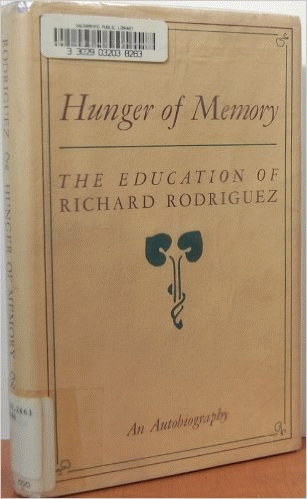This year the US National Poet Laureate is a Juan Felipe Herrera. He is the first Mexican-American or Chicano laureate. He sees himself as a Chicano and has promoted himself as both Chicano and Mexican-American author. His parents were migrant workers in the fields around Fresno, California. He has talked about what it's like to live as an outlaw and brown in America. He has also said growing up in a migrant family is "living in literature every day".
In contrast, the most-read Mexican-American author is likely Richard Rodriguez, who doesn't wish to see himself as Hispanic nor as a representative of any minority. Rodriguez sees the labeling of people's as minority as equivalent to the job of bean-counters. For Rodriguez a "minority" simply represents "numbers" as far as he is concerned.
Since Richard Rodriguez published a collection of essays in an auto-biographical format as HUNGER OF MEMORY in 1982, Rodriguez has become possibly the most widely read author who deals often with and writes of his Mexican-American heritage.
Meanwhile, as many reviewers of note have stated, "Excerpts from his work are routinely included in the anthologies and 'readers' that form the staple of freshmen English offerings, and discussions in his works are de riguer in courses on ethnic literature and multiculturalism in the United States."[1] One recent author of American studies calls Rodriguez's work " "postracial"--which is seen as a "useful modifier for Rodriguez's vision of [an American] mestizaje, for he imagines mestizaje beyond racial categories to include sexuality and religion."[2]
In one of his more popular Youtube videos, Rodriguez talks specifically on the topic of how he negotiates between identity and heritage. "What is really happening in America is that we have really been multiracial all along."[1]
"A lot of Americans are lining up to get their DNA testing then after they discover for example that they have ancestors from Syria and Africa, they are asking, 'Why was I [always] told that I was white?'"
Rodriguez explains. "The world is learning that we are of a mixed world." He adds, "You know, America has an older tradition of the outsider within the country. it's a 19th Century idea that not only is the outsider accepted into the country but that we are all somehow immigrants--except for the Native Americans."
"The identity of the American contains within it the image of the outsider." Rodriguez emphasized, and he now turns to Europeans, such as the Spanish and French to relook at their own multicultural peoples, who formed and have come from all over and have helped evolved their European territories over the past millennium.
Rodriguez adds that historically, when he visits Europe, children of immigrants are told that they must learn and adapt to French, Spanish or European ways of doing things, but Rodriguez says, "I think that the children of the new Europe should be encouraged to think that they are creating something new, not only being called to adapt."[3]
In 1982 in Hunger of Memory, Rodriguez declared, "I do not search Mexican graveyards for ties to unnameable ancestors." This is the sort of thing that many Chicanos have constantly critiqued about Rodriguez's writings throughout the latter part of this past century--even as Rodriguez's writings have become more and more ubiquitous.
NOTE: Paravisini-Gebert explains, "The genre of ethnic autobiography requires the articulation of a life from within bounds of a particular ethnic experience, but Rodriguez seeks to evade the 'ethnic literature' label and defines his trajectory toward adulthood as one of disassociation from ethnic roots. His 'metaphor of self' is rooted in his acquisition of a language and a universe of knowledge that can erase the marks of ethnicity that are his undesired ancestral and historical legacy."
In a recent commencement address, Rodriguez still laments finding his popular works being placed in the section of Borders bookstore in something called "Latin American Studies"--placed sadly so far from the works of English authors who he himself had enjoyed so much growing up as a college youth in his day. [Rodriguez joked in that same commencement address that at night when everyone goes home, his books and all those English-authored books in the local Borders Bookstore would parade over to the coffee bar and chat till dawn.]
On the Revelle Forum, another speech, we hear Rodriguez relate of his upbringing in Sacramento,California as the younger son of a lower middle class family, "I want to be clear with you tonight, that my [being] brown was never an oppression in [my] Sacramento. It was rather a kind of permission. I was largely irrelevant in Sacramento, but I had permission to stick around".The only burden was that [as Brown] I was irrelevant." In short, Rodriguez was effected by being a brown-skinned person in American society but he was not personally as mistreated as many peoples who call themselves Chicanos or see themselves first as Mexican-Americans rather than as an American.
However, Rodriguez advocates that many Americans must begin using "Brown" to refer to themselves rather than referring to themselves as being "white" and "black". He believes that if people, like Halle Berry (whose mother is white), would recognize that she is not an African American but "brown" (like a majority of Americans), then she and all of us Americans would have a completely different idea of what and who we are.
In the Revelle Forum speech noted above, Rodriguez shared that for him one of the whitest people he had ever met was Bill Clinton, who has declared that he was at least 1/16th Native American. (Rodriguez winks that he'd have loved to have met that Cherokee grandmother and had seen her brown color.)
(Note: You can view every article as one long page if you sign up as an Advocate Member, or higher).





